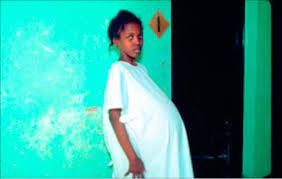
This column is designed to highlight issues affecting women and children across all sectors and also give them opportunities to express their views.
When it comes to teenage pregnancy, The Gambia is a country of contradictions. The issue is widely acknowledged as a major public health concern, with high rates of maternal and infant mortality and a growing burden on the country's fragile health system. However, there remains a stubborn silence around the issue, with many families and communities reluctant to confront the root causes and find solutions.
In this article, we explore the cultural, social, and economic factors that contribute to teenage pregnancy in The Gambia, and what it takes to break the silence and create a brighter future for young girls in the country.
According to the 2013 Gambia Demographic and Health Survey (GDHS), the teenage pregnancy rate in The Gambia is 28%. This means that nearly one in three teenage girls in The Gambia becomes pregnant before the age of 19. The GDHS also found that the median age at first sexual intercourse for women in The Gambia is 18.5 years old.
The BMC Public Health also stated that The Gambia has come with a high rate of adolescents, indicating that girls marry about ten years earlier than boys with significant variation across regions; 9% in Brikama and 29% in Kuntaur, with an overall burden of 14% in the country. About 32% of the population is adolescent; however, only 7 to 9% utilize family planning due to poor quality of care, lack of knowledge, and other cultural constructs. Teenage pregnancy and early motherhood could expose females to infections like HIV, unintended pregnancy, and high maternal mortality. In The Gambia, unintended pregnancy has shown a high rate of increase, from 18,000 in 2012 to 20,000 in 2016.
World Bank also reported in 2017 that marriage and teenage pregnancy often lead to school dropouts and poor or delayed educational achievements. Approximately 15-20 per cent of dropouts for girls in secondary school are triggered by child marriage and teenage pregnancy. Many young girls are, therefore, trapped in a cycle of poverty because of limited opportunities for employment and income. Child marriage and teenage pregnancy also predict more children over a woman’s lifetime, affecting the entire population growth of the country.
Media reports have also shown that the Gambia Government has implemented several programs and policies aimed at reducing teenage pregnancy rates, including comprehensive sex education in schools, access to family planning services, and community-based interventions.
Despite these efforts, teenage pregnancy remains a significant issue in The Gambia, and more work needs to be done to address the underlying factors that contribute to this problem.
The reasons for teenage pregnancy in The Gambia are complex and multifaceted, but they include poverty, lack of access to education and healthcare, cultural and social norms that promote early marriage and childbearing, and inadequate reproductive health education.
Recently, a reliable source from Kombo Central informed journalists that a deputy Imam, name is withheld, was reported to have impregnated a teenage girl and her mother.
Speaking to Dr Stephanie Awa Mendy, a Gynecologist at the Bundung Maternal and Child Hospital, indicated that teenage pregnancy can have serious consequences for the health and well-being of both the mother and the child. She added that young mothers are more likely to experience complications during pregnancy and childbirth, and their children are at higher risk of prematurity, low birth weight, and infant mortality.
"Teenage pregnancy can also have long-term negative effects on the education and economic opportunities of young women, perpetuating cycles of poverty and social disadvantage," she stated.
Dr Sylva also pointed out that it has also been noticed that some teenagers also abort their pregnancies, which is usually performed by unskilled personnel leading to unsafe abortions.
“This usually leads to hemorrhage sepsis and this can lead to several complications and even death of teenagers,” she stated. “Family planning for teenagers who are already sexually active should be encouraged to avert the risk of having many children being dumped, street children who may not have the opportunity to go to school because of lack of financial support. These kids might even turn out to be criminals as they strive for survival.”
She noted that addressing teenage pregnancy in The Gambia includes increasing access to education and healthcare, providing comprehensive reproductive health education, promoting gender equality and women's empowerment, and addressing the root causes of poverty and social inequality.
"However, much work remains to be done to ensure that young women and girls in The Gambia have the resources and support they need to make informed decisions about their reproductive health and achieve their full potential," she added.
A 14-year-old girl, whose name is withheld, lamented that she was impregnated by her uncle and is now a school dropout.
"My mother asked me to keep quiet and she forcefully sent me to my auntie’s house. That's where I stayed until after delivery and up to date, no one knew that I was raped by my uncle. I felt maltreated and it's not fair. I want justice to prevail but those that should help me get justice are the ones asking me to keep quiet,” she emotionally narrated.
Lawkadinch S. Gomez, a gender activist and Pioneer Project 21, explains that the rate of teenage pregnancy is quite high recently in The Gambia. This, she said, is happening not only in one geographical location or region but right across the country.
She explained that the causes of this unfortunate happening might involve a lot of things, saying it goes beyond parental care and observation. Even though there is negative peer influence, she stated that the high cost of living and the “want” of luxurious gifts push also teenage girls (whose bodies are just beginning to develop) to pregnancy.
She emphasised that in most cases, men responsible for such are way older while affirming that under the Gambian Law, it is rape if there is any sexual activity done with a person below 18 years of age.
“However, for cases where both parties responsible for the pregnancy are minors or at the same educational level, the male is allowed to continue his education and the girl isn’t, contributing to the female dropout rate,” she stated, saying: “The rampant sexual activities involving teenagers also contribute to the high vaginal infection rate and the increase in STIs in the country.”
She said further: “I keep pushing for open conversations on sexuality and sexual health in the homes and communities. This is the first comfort zone of a child and if these conversations are normalised, the curiosity to explore what sex is reduces as they have first-hand knowledge of what it is.”
Miss Gomez also highlights that sexuality also discusses the values of an individual, family and religion, especially the takes on sex. This, she explains, allows the child to learn what is expected of her as a school-going child.
She says sexuality also explains how unprepared the body is for teenage pregnancies, adding that the body isn’t well developed to carry a child.
This enables the children to understand that the age they are in isn’t safe for childbirth, she said, adding: “If these healthy conversations are held in our homes and communities, then we will have less to worry about. Children, out of curiosity, try to explore their bodies, which leads them to pregnancies. It also debunks the myth that sex is bad but brings out the right information on sex. Sex isn’t bad but the time for sex is religiously advised (or health-wise).”
She continued: “The school also has a role to play. What is explained above is just a bit of what the Comprehensive Sexuality Education curriculum entails. The schools are to introduce such for each grade to understand, starting from primary school as puberty starts while children are in primary school. Introduce this to ensure all misinformation about sexuality is debunked. Children are taken through a path of growth mentally to understand that their bodies are going through a lot of development. This also covers cultural and religious obligations and studies on early pregnancies and the consequences.”
She further emphasised that no one should turn a blind eye to the fact that some teachers have impregnated students. She explained that every other elder who has sexual contact with a teenager below 18, in this case, should face the law and the teacher should also face the consequences placed by the Ministry of Education as well.
She revealed that the nurses and doctors need to ensure that the clinics and hospitals enforce the secrecy and Anti-shaming principle of the medical code of conduct, being the first point of contact. She upholds that when teenagers are feeling overwhelmed with their bodies, nurses and doctors should share the right information and help teenagers without shaming or bullying them, especially when a pregnancy is discovered.
Lamin Fatty, the national coordinator of the Child Protection Alliance (CPA), stated that teenage pregnancy continues to be a major concern in The Gambia and that it is unfortunate there is no comprehensive data on this aspect.
He added that there are laws that prohibit child marriage and equally protect the child from any form of sexual exploitation or abuse, while emphasizing that the lack of enforcement of these laws has contributed to this menace.
Fatty further explained that the role of CPA in protecting Gambian children from teenage pregnancy is numerous. "CPA has over the years continued to straightening knowledge and understanding on the laws relating to child sexual exploitation and abuse,” he said. “Regarding the effects of teenage pregnancy on the lives and wellbeing of children, we continue to advocate for the effective enforcement and implementation of laws and policies relating to Gender-Based Violence."
He concluded by emphasizing that parents must take up their responsibility when it comes to the well-being of their children, saying there is a great need for effective communication between children and their parents.
“The law has emphasised the responsibility of parents in safeguarding children from any form of exploitation and abuse,” he pointed out.



